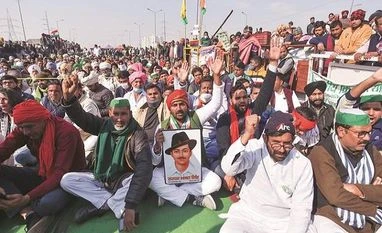An eerie silence prevailed in several of the protest sites on Wednesday, a day after Republic Day, when thousands of farmers broke through the barricades and laid siege to central Delhi and reached even the Red Fort.
While officially most of the protesting unions have maintained the agitation will continue peacefully and are planning their course of action starting with a day-long fast on January 30, the martyrdom day of Mahatma Gandhi, behind the scenes several say that Republic Day violence has dented the credibility of their protests, which have been going on for more than two months.
“The protests will only intensify from here and while we demand an impartial probe into the violence on January 26, we firmly lay down that our struggle will continue until all the three farm Acts are repealed while another is made to make minimum support price a legal right,” said the All India Kisan Sabha (AIKS), one of main groups participating in the protests.
In Ghazipur, where Bhartiya Kisan Union (BKU) leader Rakesh Tikait has been staging the protests, the farmers have dug in following reports that he might be arrested for his alleged role in inciting the protesters on January 26.
Reports said that ever since Tikait’s emotional outburst accusing the government of trying to kill him and his supporters on the ruse of arresting them, the crowd at the Ghazipur border has grown manifold.
A panchayat called by his brother Naresh Tikait in neighbouring Muzaffarnagar drew a strong response.
On its part, the central government, too, has stopped talking much about the laws and sources say the offer made by the government in its last round of meeting with the farmer leaders — putting the laws on hold for up to 18 months by giving a written affidavit to the Supreme Court — is the best it can do in the current circumstances.
Though President Ramnath Kovind and the Economic Survey have defended the farm laws, officials say as implementation has been put on hold for two months by the Supreme Court and a high-level panel is looking into the Acts, there is little the government can do.
“The matter is now with the Supreme Court, which has stayed its implementation and there is little we can do,” a senior official said.
He said if the implementation was delayed for a few years, as had been proposed by the Centre, the laws would stay and then it would depend on the committee the Centre has proposed to constitute to look into all aspects of the Acts and whether they could be made optional for the states, etc.
“The time can be utilised to further strengthen the laws to make them more farmer-friendly and clear all doubts,” the official said.
What can come to the government’s rescue now is that rabi crop harvesting is expected to begin in the next few weeks in full strength in North India and farmers may not be able to give full time to the protest.
Wheat, chana (gram), and mustard are the main crops that are harvested during the season and they are majorly grown in the current protest hotbeds of Punjab, Haryana, Rajasthan, western Uttar Pradesh, and Madhya Pradesh.
According to the latest report of the Ministry of Agriculture, wheat has been sown in around 34.63 million hectares this season, which is around 3 per cent more than in the same period last year, whereas for gram it is 11.20 million hectares (4.37 per cent more), and for mustard around 7.34 million hectares (7.03 per cent more).
“The protest is no longer a farmers’ agitation and has become political in nature, or else where on earth do you see people carrying arms,” said Badri Narayan Chaudhury, all India general secretary to the Bhartiya Kisan Sangh (BKS), the farmers’ wing of the Rashtriya Swayamsevak Sangh.
He said the only way forward for both the Centre and the farmers was to come to the dialogue table to sort all outstanding issues.
Political parties, which have largely stayed outside the ambit of the protests, have started getting involved in the agitation, something which the protesters resisted in the initial days.
With a string of Assembly elections scheduled in the next couple of years, including the important Uttar Pradesh elections, it is just a matter of time before parties start taking up their cause.
After the Ghazipur episode, many opposition leaders have now started queuing up at protest sites in support of the farmers.
Unlock 30+ premium stories daily hand-picked by our editors, across devices on browser and app.
Pick your 5 favourite companies, get a daily email with all news updates on them.
Full access to our intuitive epaper - clip, save, share articles from any device; newspaper archives from 2006.
Preferential invites to Business Standard events.
Curated newsletters on markets, personal finance, policy & politics, start-ups, technology, and more.
)